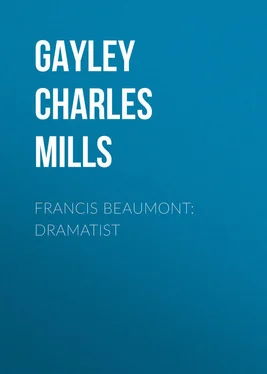Charles Gayley - Francis Beaumont - Dramatist
Здесь есть возможность читать онлайн «Charles Gayley - Francis Beaumont - Dramatist» — ознакомительный отрывок электронной книги совершенно бесплатно, а после прочтения отрывка купить полную версию. В некоторых случаях можно слушать аудио, скачать через торрент в формате fb2 и присутствует краткое содержание. Жанр: cinema_theatre, foreign_antique, foreign_prose, Биографии и Мемуары, на английском языке. Описание произведения, (предисловие) а так же отзывы посетителей доступны на портале библиотеки ЛибКат.
- Название:Francis Beaumont: Dramatist
- Автор:
- Жанр:
- Год:неизвестен
- ISBN:нет данных
- Рейтинг книги:5 / 5. Голосов: 1
-
Избранное:Добавить в избранное
- Отзывы:
-
Ваша оценка:
- 100
- 1
- 2
- 3
- 4
- 5
Francis Beaumont: Dramatist: краткое содержание, описание и аннотация
Предлагаем к чтению аннотацию, описание, краткое содержание или предисловие (зависит от того, что написал сам автор книги «Francis Beaumont: Dramatist»). Если вы не нашли необходимую информацию о книге — напишите в комментариях, мы постараемся отыскать её.
Francis Beaumont: Dramatist — читать онлайн ознакомительный отрывок
Ниже представлен текст книги, разбитый по страницам. Система сохранения места последней прочитанной страницы, позволяет с удобством читать онлайн бесплатно книгу «Francis Beaumont: Dramatist», без необходимости каждый раз заново искать на чём Вы остановились. Поставьте закладку, и сможете в любой момент перейти на страницу, на которой закончили чтение.
Интервал:
Закладка:
The sixth Baron became, in 1440, the first Viscount of English creation; he married a granddaughter of the Lord Bardolph of Shakespeare's 2 Henry IV ; but with his son "of simple wit," who died in 1507, the viscounty died out. Beaumanoir to the east of Charnwood is seven miles north of Leicester and nine from Coleorton where, west of the Forest, an older branch of the Beaumont family of which we shall hear, later, continued to live and is living to-day; and the old barony was revived, in 1840, in a descendant of the female line, Miles Thomas Stapleton, as ninth Baron Beaumont.
The grandfather of the dramatist, John Beaumont, was in the third generation from Sir Thomas Beaumont, the younger son of the fourth Lord Beaumont. John evidently had to make his way before he could establish himself near the old home in Leicestershire; but he must have had some competence and position from the first, for he was admitted early, in the reign of Henry VIII, a member of the Inner Temple; in 1537 and 1543 he performed the learned and expensive functions of Reader, or exponent of the law in that society, and later was elected treasurer or presiding officer of the house. He started brilliantly in his profession. In 1529 he was counsellor for the corporation of Leicester; and, by 1539, he had means or influence sufficient to secure for himself the old Nunnery of Grace-Dieu in Charnwood Forest, which, as an ecclesiastical commissioner he had four years earlier helped to suppress. That he entered into possession, however, only with difficulty, is manifest from a letter which he wrote in 1538 to Lord Cromwell, enclosing £20 as a present and beseeching his lordship's intercession with the king that he may be confirmed in his ownership of the "demenez" as against the cupidity of George, first Earl of Huntingdon, who "doth labour to take the seyd abbey ffrom me; … for I do ffeyre the seyd erle and hys sonnes do seeke my lyffe." 5 5 Letters relating to the Suppression of the Monasteries , pp. 251-252, Camden Society, 1843. The editor, Thos. Wright, describes the petitioner as of Thringston, Co. Leicester.
He occupied various important legal and administrative positions in the county, and, shortly before the death of Edward VI, was appointed to the high office of Master of the Rolls, or Judge of the Court of Appeal. A year or two later, however, early in 1553, he was removed from his seat on the bench, for defalcation and other flagrant breach of trust. He was imprisoned and fined in all his property, and died the next year. His vast estates were bestowed on Francis, Earl of Huntingdon, by Edward VI, but soon afterward, as a result of legal manœuvre and by the assistance of that Earl and his eldest son, the widow of the Master of the Rolls contrived to retain the manor of Grace-Dieu; and it long continued to be the country seat of the Beaumonts. 6 6 J. M. Rigg, Dict. Nat. Biog. art., John Beaumont ; and Nichols's History of Leicestershire , III, ii, 651, et seq.
This prudent, strenuous, and high-born lady, Elizabeth Hastings, was the daughter of Sir William Hastings, a younger son of the incorruptible William, Lord Hastings, whom in 1483 Richard of Gloucester had decapitated. Her grandmother, Catherine Nevil, was daughter to the Earl of Salisbury, who died at Pomfret, and sister to Richard, Earl of Warwick, the King-maker. Elizabeth's aunt, Anne Hastings, was the wife of George Talbot, fourth Earl of Shrewsbury, and her uncle, Edward, was the second Lord Hastings. Edward's children, our Elizabeth's first cousins, were Anne, Countess to Thomas Stanley, second Earl of Derby, and that George, first Earl of Huntingdon, whom, with certain of his five sons, the master of Grace-Dieu "ffeyred." 7 7 Collins, Peerage , VI, 648, et seq. ; H. N. Bell, The Huntingdon Peerage , 1821. See also, below, Appendix, Table B.
We may conjecture that the feud expired with the marriage of Elizabeth Hastings and John Beaumont, or with the death of the first Earl in 1544; and that the policy of his successors, Francis and Henry, in securing to the Huntingdon family the reversion of the forfeited estates of the Master of the Rolls and, later, releasing a portion of them to Elizabeth, was dictated by cousinly affection.
The great Francis, second Earl of Huntingdon, lived in the castle of Ashby-de-la-Zouch, about an hour's walk from Mistress Beaumont's, and had, in 1532, allied himself to royalty by marrying Katherine Pole, niece of the Cardinal, and great-granddaughter of that George, Duke of Clarence (brother to Edward IV), who was "pack'd with post-horse up to heaven" by the cacodemon of Gloucester. When Edward VI died, Francis declared for Lady Jane Grey and was for a time imprisoned. His daughter was the beautiful Lady Mary Hastings who, being of the blood royal, was wooed for the Czar, and might have been "Empress of Muscovy" had she pleased. From the Huntingdon family Elizabeth Hastings introduced at least one new Christian name into that of the Beaumonts. For the second Earl, she named her oldest son Francis. One of her daughters, Elizabeth, became the wife of William, third Lord Vaux of Harrowden, in the adjoining county of Northampton; and thus our dramatist, through his aunt, was connected with another of the proudest Norman families of England, – one of the most devoted to the Catholic faith and, as we shall see, active in Jesuit interests that during the dramatist's life in London assumed momentous political proportions. Aunt Elizabeth, Lady Vaux, died before our Frank Beaumont was born; and her son Henry died when Frank was but ten years of age, – but in an entry in the State Papers of 1595 concerning "the entail of Lord Vaux's estates on his children by his first wife [John] Beaumont's daughter," 8 8 Calendar of State Papers ( Domestic ), 1595, p. 154.
several "daughters" are mentioned. These, his cousins of Harrowden, Frank knew from his youth up. In 1605 all England was to be ringing with their names.
John and Elizabeth were succeeded at Grace-Dieu by their son, Francis. He was a student at Peterhouse, Cambridge; afterwards, at the Inner Temple, where like his father before him, he proceeded Reader and Bencher. In 1572 he sat in Parliament as member for Aldborough; in 1589 he was made sergeant-at-law; and in 1593 was appointed one of the Queen's Justices of the Court of Common Pleas. His method of trying a case, technical and merciless, may be studied in the minutes of the Lent assizes of 1595 at which the unfortunate Jesuit priest, Henry Walpole, was sentenced to death for returning to England. 9 9 Challoner, Missionary Priests , I, 347.
His career on the bench was both successful and honourable; and he is described by a contemporary, William Burton, the author of the Description of Leicestershire , as a "grave, learned, and reverend judge." He married Anne, the daughter of a Nottinghamshire knight, Sir George Pierrepoint of Holme-Pierrepoint; and their children were Henry, born 1581; John, born about 1583; Francis, the subject of this study, born in 1584 or 1585; and Elizabeth, some four years younger than Francis. 10 10 For the preceding details, and some of those which follow, see the respective articles in the Dictionary of National Biography ; Dyce's Works of Beaumont and Fletcher , Vol. I, Biographical Memoir ; Grosart, Sir John Beaumont's Poems , and the sources as indicated. See also, below, Appendix, Table C.
That we know nothing of the life or personality of this mother of poets, is a source of regret. Her family, however, was of a notable stock possessed, immediately after the Conquest, of lands in Sussex under Earl Warren. Their estate of Holme-Pierrepoint in Nottinghamshire they had inherited from Michael de Manvers during the reign of Edward I. Anne's ancestors had been Knights Banneret, and of the Carpet and the Sword, for generations. Her brother, Sir Henry Pierrepoint, born 1546, married Frances, the eldest daughter of the Sir William Cavendish who began the building of Chatsworth, and his redoubtable Lady, Bess of Hardwick, who finished it. This aunt of the young Beaumonts of Grace-Dieu, Lady Pierrepoint, was sister to William Cavendish, first Earl of Devonshire in 1611 and forefather of the present Dukes, – to Henry Cavendish, the friend of Mary, Queen of Scots, and son-in-law of her kindly custodian, George Talbot, sixth Earl of Shrewsbury, – to Sir Charles Cavendish, whose son, William, became Earl, and then Duke of Newcastle, – to Elizabeth Cavendish, Countess of Lennox, the wife of Henry Darnley's brother, Charles Stuart, and the mother of James I's hapless cousin, Lady Arabella Stuart, – and to Mary Cavendish, Countess of Shrewsbury, wife of Gilbert, seventh Earl. The son of Sir Henry and Lady Pierrepoint, Robert, born in the same year as his cousin, Francis Beaumont, the dramatist, married a daughter of the Talbots, became in due time Viscount Newark and Earl of Kingston, and was killed in 1643 during the Civil War. From him descended Marquises of Dorchester and Dukes of Kingston, and the Earls Manvers of the present time. Through their mother, Anne Pierrepoint, the Beaumont children of Grace-Dieu were, accordingly, connected with several of the most influential noble families of England and Scotland; and in their comradeship with the cousins of Holme-Pierrepoint they would, as of the common kin, be thrown into familiar acquaintance with the children of the various branches of these and other houses that I might mention. 11 11 See Shaw's Knights of England ; Collins, Peerage ; and articles in D. N. B. under names.
Holme-Pierrepoint is seventeen miles northeast of Grace-Dieu, near the city of Nottingham, in the red sand-stone country along the River Trent. The Park is but a two or three hours' drive from Charnwood, and the old house to which Anne used to take her children to see their grandparents still stands, altered only in part from what it was in 1580. It belongs to the Earl Manvers of to-day. In the church is the tomb of the poet's uncle, Sir Henry Pierrepoint, who died the year before Francis.
Интервал:
Закладка:
Похожие книги на «Francis Beaumont: Dramatist»
Представляем Вашему вниманию похожие книги на «Francis Beaumont: Dramatist» списком для выбора. Мы отобрали схожую по названию и смыслу литературу в надежде предоставить читателям больше вариантов отыскать новые, интересные, ещё непрочитанные произведения.
Обсуждение, отзывы о книге «Francis Beaumont: Dramatist» и просто собственные мнения читателей. Оставьте ваши комментарии, напишите, что Вы думаете о произведении, его смысле или главных героях. Укажите что конкретно понравилось, а что нет, и почему Вы так считаете.












